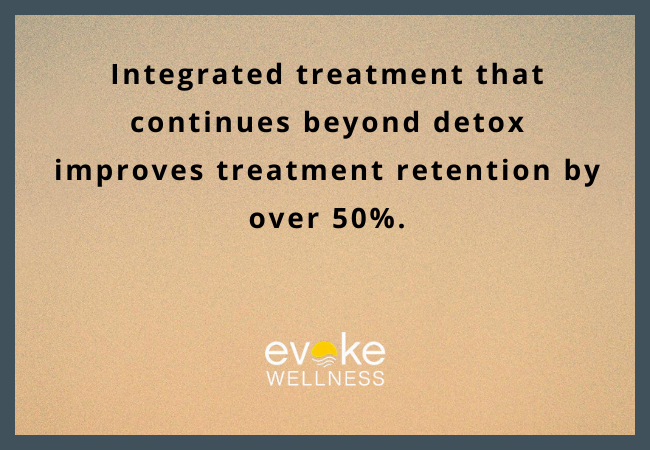When beginning the journey toward sobriety, detoxification is often the first and most crucial step. However, not all detox processes are the same. The body responds differently depending on the substance used, the duration of abuse, and the presence of co-occurring physical and mental health conditions. Two of the most common types of detox—alcohol and opioids—come with distinct challenges and treatment approaches that require careful medical attention.
At Evoke Wellness, we offer medically supervised detox tailored to the needs of each individual. This blog explores the key differences between detoxing from alcohol versus opioids, the challenges involved in each, and the importance of choosing a program equipped to handle both the physical and emotional complexities of the detox process.
The Purpose and Process of Detox
Detox, short for detoxification, refers to the process by which the body clears itself of toxins, particularly drugs and alcohol. During this period, individuals often experience withdrawal symptoms—both physical and psychological—that range in severity depending on the substance involved. While detox does not “cure” addiction, it provides a critical foundation for recovery by stabilizing the individual and preparing them for further treatment.
Detox must be conducted in a safe, supportive, and medically monitored environment, especially for individuals detoxing from substances that cause severe or life-threatening withdrawal symptoms. At Evoke Wellness, our clinical team provides around-the-clock care, using evidence-based protocols to manage symptoms, reduce discomfort, and mitigate complications.
Alcohol Detox: Symptoms, Timeline, and Risks
Detoxing from alcohol is a medically serious process due to the potential for dangerous complications such as seizures and delirium tremens (DTs). Alcohol acts as a central nervous system depressant, and over time, the brain adapts to its presence. When alcohol use stops suddenly, the brain becomes hyperactive, leading to a range of intense withdrawal symptoms.
Common Alcohol Withdrawal Symptoms:
-
Anxiety and irritability
-
Tremors or “the shakes”
-
Nausea and vomiting
-
Headache
-
Sweating
-
Insomnia
-
Elevated heart rate and blood pressure
-
Hallucinations
-
Seizures
-
Delirium tremens (DTs)
Timeline:
Alcohol withdrawal symptoms typically begin within 6–12 hours after the last drink, peak within 48–72 hours, and may persist for up to a week. In more severe cases, symptoms such as DTs can begin after 2–3 days and may last several days.
Because of these risks, Medical Detox Programs in Massachusetts are strongly recommended for individuals detoxing from alcohol. Medical supervision allows for the administration of medications (such as benzodiazepines) to ease symptoms and prevent dangerous complications.
Opioid Detox: Symptoms, Timeline, and Risks
Detoxing from opioids, including prescription painkillers and heroin, is physically grueling but generally less medically dangerous than alcohol withdrawal. Opioids bind to receptors in the brain that regulate pain and emotion. With repeated use, the brain becomes dependent on these substances, and sudden discontinuation leads to withdrawal. For those seeking long-term support beyond the initial detox, enrolling in an effective Opioid Rehab Program in Massachusetts can provide the comprehensive therapy and structure necessary for sustained recovery.
Common Opioid Withdrawal Symptoms:
-
Muscle aches
-
Nausea and vomiting
-
Diarrhea
-
Sweating and chills
-
Insomnia
-
Anxiety and agitation
-
Runny nose and teary eyes
-
Abdominal cramping
-
Restlessness
-
Intense cravings
Timeline:
Opioid withdrawal symptoms usually begin within 12–24 hours after the last dose and peak within 72 hours. Acute symptoms can subside after 5–7 days, although post-acute withdrawal symptoms (PAWS) such as mood swings and sleep issues can linger for weeks or months.
Though opioid withdrawal is rarely life-threatening, it can be extremely uncomfortable, leading many people to relapse quickly if they are not in a controlled environment. Medication-assisted treatment (MAT) with medications like methadone, buprenorphine, or clonidine can reduce symptoms and cravings.
The staff at Evoke Wellness use MAT and other evidence-based strategies to ensure clients undergoing Drug and Alcohol Detox in Massachusetts are safe, comfortable, and supported throughout their detox.
Shared Challenges in Alcohol and Opioid Detox
Despite their differences, detoxing from alcohol and opioids share a number of common challenges:
1. Cravings and Risk of Relapse
One of the most significant risks during detox is relapse. Both alcohol and opioids trigger intense cravings as the body attempts to restore chemical balance. Without medical supervision and therapeutic support, it can be difficult for individuals to avoid returning to substance use.
2. Co-Occurring Mental Health Issues
Many individuals entering detox struggle with underlying mental health disorders such as depression, anxiety, or trauma. If these issues aren’t addressed during and after detox, they can significantly undermine recovery efforts. At Evoke, we emphasize Dual Diagnosis Treatment in Massachusetts to ensure both addiction and mental health are treated simultaneously.
3. Lack of Preparation for Long-Term Recovery
Detox is the first step—not the final solution. Many people complete detox and believe they are “cured,” only to relapse due to the absence of coping skills, therapy, or a support system. This highlights the importance of seamless transition from detox into a structured rehab program.
Differences in Medication Protocols
Alcohol and opioid detoxes rely on different medications to manage withdrawal symptoms. In alcohol detox, benzodiazepines are commonly used to reduce the risk of seizures and DTs. Other medications like anticonvulsants, beta blockers, or antipsychotics may also be used as needed.
In contrast, opioid detox often involves the use of MAT medications like buprenorphine or methadone, which help ease withdrawal symptoms and reduce cravings. These medications can be continued throughout treatment and sometimes even into long-term recovery as part of a structured treatment plan.
The ability to tailor medication to the specific substance and individual needs is a hallmark of our Intensive Inpatient Program in Massachusetts—providing clients with the highest level of medical and psychological care during their stay.
The Role of Therapy in Detox
While detox focuses on stabilizing the body, integrating therapeutic services during and immediately after detox significantly enhances recovery outcomes. Therapy helps individuals understand the root causes of their substance use, manage emotions, and prepare for life without drugs or alcohol.
Clients at Evoke Wellness begin therapy early in their treatment experience, even during detox. Through individual and group sessions, they start building insight, resilience, and the motivation to move forward into the next phase of care.
Transitioning Into Long-Term Care
The most successful recoveries occur when detox is immediately followed by comprehensive treatment. After stabilization, clients are encouraged to transition into a Residential Treatment Program in Massachusetts where they can receive ongoing therapy, participate in peer support groups, and develop life skills that promote sustained sobriety.
In residential care, clients also benefit from:
-
Family counseling and education
-
Psychiatric services
-
Nutritional support and wellness activities
-
Relapse prevention planning
-
Aftercare and discharge coordination
This full continuum of care ensures that every individual receives the tools, structure, and support needed to maintain long-term recovery and thrive in everyday life.
Why Choose Evoke Wellness?
Evoke Wellness offers a premier environment for safe, medically managed detox from alcohol and opioids. Our multidisciplinary team includes licensed medical professionals, therapists, and support staff who understand the complexity of addiction and are committed to holistic healing.
Here’s what sets our detox program apart:
-
Personalized Treatment Plans: We assess each individual’s physical health, substance use history, and mental health needs to create a customized detox protocol.
-
24/7 Clinical Supervision: Clients are monitored by medical professionals throughout the detox process to ensure safety and minimize discomfort.
-
Therapeutic Support: We begin therapy during detox to help clients understand their addiction and begin building a foundation for recovery.
-
Mental Health Integration: For clients with co-occurring disorders, our dual diagnosis team ensures all conditions are addressed.
-
Smooth Transitions: We coordinate immediate step-down care so clients can move directly into residential or outpatient treatment after detox.
Whether you’re detoxing from alcohol or opioids, our compassionate approach provides the medical and emotional support needed to start your recovery with confidence.
Conclusion
Alcohol and opioid detox are unique in their symptoms, risks, and treatment needs—but both are essential starting points on the path to lasting recovery. Detox alone is not enough. A complete recovery journey includes medical care, emotional healing, therapy, and structured long-term support.
At Evoke Wellness, we’re committed to walking with you every step of the way—from detox to lasting transformation. Whether you’re struggling with alcohol or opioid addiction, we have the tools, expertise, and compassion to help you start over—stronger than ever. Call us today at 866.931.6429 to speak with a caring admissions coordinator and begin your recovery journey.
Frequently Asked Questions
What are the main differences between alcohol and opioid detox?
Alcohol detox can lead to life-threatening symptoms like seizures or delirium tremens, while opioid detox is usually not fatal but causes intense physical discomfort. Each requires different medical approaches.
Is medical supervision necessary for both types of detox?
Yes. Both alcohol and opioid detox benefit from medical supervision. Alcohol detox often requires urgent care due to seizure risk, and opioid detox requires support to manage severe symptoms and prevent relapse.
How long does detox take for alcohol versus opioids?
Alcohol detox typically lasts 5–7 days, while opioid detox may last a week or longer depending on the substance used, duration, and individual health factors.
Can I detox at home from alcohol or opioids?
Detoxing at home is not recommended for either. Alcohol detox can be life-threatening without medical care, and opioid withdrawal symptoms are often too intense to manage safely alone.
What happens after detox at Evoke Wellness?
After detox, clients often transition into residential or outpatient programs where they receive therapy, psychiatric care, relapse prevention planning, and ongoing support for lasting recovery.





